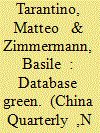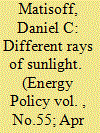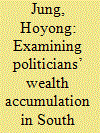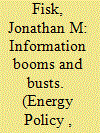| Srl | Item |
| 1 |
ID:
151584


|
|
|
|
|
| Summary/Abstract |
Significant efforts towards environmental transparency have been made by the Chinese government since 2008. This paper focuses on the technical decisions shaping a database of official pollution information built and operated by a Chinese NGO known as the Institute of Public and Environmental Affairs (IPE). Issues of standardization, power distribution and institutional fragmentation are discussed. The paper illustrates a case of NGOs integrating enforcement capabilities as data centres amidst the growing reliance on processes of informational governance of environmental issues.
|
|
|
|
|
|
|
|
|
|
|
|
|
|
|
|
| 2 |
ID:
119832


|
|
|
|
|
| Publication |
2013.
|
| Summary/Abstract |
This study assesses the effectiveness of two types information disclosure programs - state-based mandatory carbon reporting programs and the voluntary Carbon Disclosure Project, which uses investor pressure to push firms to disclose carbon emissions and carbon management strategies. I match firms in each program to control groups of firms that have not participated in each program. Using panel data methods and a difference in differences specification, I measure the impact of each program on plant-level carbon emissions, plant-level carbon intensity, and plant level output. I find that neither program has generated an impact on plant-level carbon emissions, emissions intensity, or output. Placing this study in contrast with others that demonstrate improvements from mandatory information disclosure, these results suggest that how information is reported to stakeholders has important implications for program effectiveness.
|
|
|
|
|
|
|
|
|
|
|
|
|
|
|
|
| 3 |
ID:
182782


|
|
|
|
|
| Summary/Abstract |
This study investigates the distortion of government disclosure on air pollution and further explores underlying political incentives that drive such distortion. We introduce a newly developed method, that is, bunching estimation based on notch points, to identify the distortion in the air pollution index disclosed by local governments. Results show that the magnitudes of distortion are significant and vary across cities. We present evidence that local politicians' promotion incentives substantially drive the distortion of environmental information. Importantly, we find that high-frequency disclosure requirements effectively discipline the behaviors of local governments because of increased manipulation costs. Overall, we contribute to the literature by identifying the distortion of government information disclosure, investigating the underlying causes, and examining the validity of new disclosure policies in shaping government behaviors.
|
|
|
|
|
|
|
|
|
|
|
|
|
|
|
|
| 4 |
ID:
172650


|
|
|
|
|
| Summary/Abstract |
One of the public’s popular beliefs about politics is that politicians engage in rent-seeking behaviors, such as accumulating property, using their political power. By applying a regression discontinuity design, this study examines whether members of the National Assembly of South Korea gained assets during three elective terms (2004–2008, 2008–2012, and 2012–2016). The results contradict the public’s claim. In general, there is minimal evidence that election winners accumulate more assets than runners-up. And observing the winners’ premium for newly elected politicians in the 2012–2016 term, I find that it is related to a political support fund, which is a legitimate channel for politicians’ funding. The results suggest that an information disclosure policy can play a pivotal role in restricting politicians’ rent-seeking behaviors.
|
|
|
|
|
|
|
|
|
|
|
|
|
|
|
|
| 5 |
ID:
166322


|
|
|
|
|
| Summary/Abstract |
Today's 'fracking debate' includes a familiar set of actors and arguments. Advocates of unconventional oil and gas production contend that it has contributed to an economic renaissance for many subnational governments and has improved American energy security. Opponents suggest that unconventional production is an environmental and public health hazard. One way that states are trying to balance the economic benefits of continued energy production with environmental protection is through the use of information disclosure requirements. Prior work notes that the rigor of state disclosure standards relative to unconventional oil and gas production vary. Through measures of association and exact logistic regression, this project expands the disclosure literature by focusing on three types of disclosure: pre-drilling notification, chemical disclosure during operations, and trade secret exemptions.
|
|
|
|
|
|
|
|
|
|
|
|
|
|
|
|